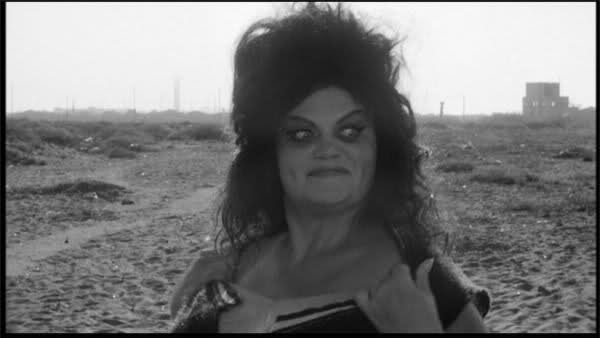There are few directors I take more heat for disliking than Federico Fellini. I think the only director near that position is Quentin Tarantino, and perhaps that’s the subject of another essay another day. My dislike of Tarantino is more amorphous; Fellini, I can tell you exactly why I don’t like him. I can tell you which of his movies made me so uncomfortable that I turned them off, and which I turned off because they just didn’t appeal to me. And, in one or two cases, which I actually finished and why.
The first Fellini movie I saw was Amarcord. Well, of course—it starts with “A.” It was on Roger Ebert’s Great Movies list, too. I was in part intrigued by his description of its beauty, and it is indeed a beautiful film. On the other hand, it’s also the first exposure I had to Fellini’s sexism.
I don’t think it ever flows over to misogyny. I think Fellini loved women. A whole lot. I just don’t think he understood them at all. And while he loved them, I’m not sure he liked them. I think he was attracted to them. I think he idolized them. I think he idolized them so much that he couldn’t help denigrating when they failed to meet his expectations.
I won’t say that all of the women in Fellini’s movies are either Madonnas or whores, but a lot of them are. And when they aren’t, I’m not much more comfortable about them. I only saw about ten or fifteen minutes of City of Women before turning it off, because it was so full of straw feminists that I couldn’t stand it. It’s supposedly about the attitudes of a middle-aged Italian man in response to “the New Woman,” but mostly what it felt like to me was a movie about how hard it is now that women aren’t the playthings of the men.
That’s the thing, in the end. It feels as though Fellini doesn’t want women to be their own people. It feels as though he wanted them to be projected through his needs and his desires. My most recent experience with him was La Strada, which left me deeply uncomfortable. Gelsomina didn’t even get to be a woman. She was a girl, an arrested child in a woman’s body. She dies of despair, and the story would have been considerably different if she had been able to have her own opinion anywhere along the way. She was sold, and she was abused, and she supposedly loved her abuser. Well, it happens. But that little girlish grin got painful to me by the end of things.
And no, I can’t just let it go. This is the part that hurts the most—I’m expected to. Even in movies where someone of my own sex is the main character, I’ve no connection with her. She’s not allowed to be a full person. She’s defined by her relationship to others. She’s sold by her mother, bought by a man who doesn’t think of her as fully human. The other people at the circus mostly think of her as another act, it seems to me. She’s being abused, and they all know it, but that’s how it goes until she could be good for them, too.
What do you remember of Anita Ekberg’s personality in La Dolce Vita? She doesn’t really have one, does she? We see her through the eyes of Marcello, because we see everything through Marcello—and I don’t like Marcello. I don’t like Guido in 8 1/2. I don’t like Titta in Amarcord. I just don’t like Fellini’s heroes, because they’re all self-absorbed children, even the ones who aren’t supposed to be children. Even when they have responsibilities, they’re more interested in themselves. Is there a married Fellini hero who isn’t having an affair?
Not that the women are allowed to have that freedom. They are owned, literally or figuratively. (It’s worth mentioning that the word “slave” does not appear in La Strada, at least not in Criterion’s subtitles.) If they have sex with someone to whom they do not belong, they are whores, often quite literally.
Weirdly, the whores are still an object of desire despite simultaneously being objects of disdain. The boys of Amarcord lust after the tobacconist, who I remember as a prostitute, but she’s kind of appalling in a lot of ways. She’s a big, sloppy woman. The protagonist’s attempt at sex with her is a joke, even though she’s clearly experienced. Sexually free women in Fellini movies are either outcast in some way or terrifying, sometimes both. It is, after all, sexually free women who pursue Snàporaz in City of Women.
I have to tell you, the combination of the films’ treatment of women and my own disdain for the films’ ostensible heroes renders them somewhere between offensive and boring to me. Beautiful, to be sure, but there we are. I’ll admit I haven’t seen a ton of Fellini; this is in part because I watch the first ten or fifteen minutes of Fellini movies and decide that I can’t possibly take any more. The reason I finished La Strada was a determination to write a surly review of it, which I wouldn’t do unless I watched the whole thing. I started Satyricon, I started Juliet of the Spirits, I started Roma. I think I even managed to finish Nights of Cabiria and just couldn’t bring myself to write five paragraphs about it and therefore didn’t write a review. I had actually intended that to be where I gave up on Fellini, but La Strada was instead. I’ve given him more chances than I’ve given a lot of other directors, and I’m done.


